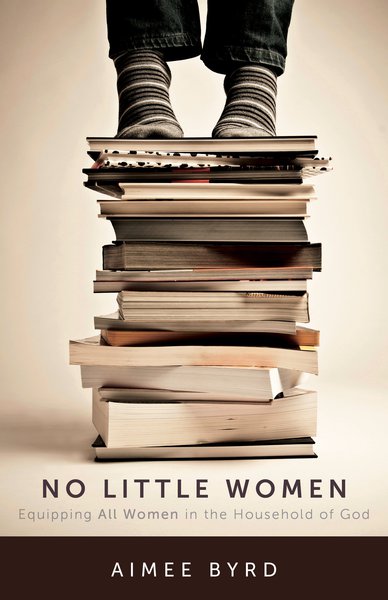
Aimee Byrd
Reviewed by: Elizabeth Holmlund
No Little Women, by Aimee Byrd. P&R Publishing, 2016. Paperback, 288 pages, list price $14.99. Reviewed by OP member Elizabeth Holmlund.
In No Little Women: Equipping All Women in the Household of God, Aimee Byrd makes the case that women in the church need to diligently apply themselves to becoming competent students of God’s word and doctrine, exercise discernment in their reading of popular Christian books marketed to women, and recognize the danger of distinguishing women’s “ministries” from the church’s primary ministry of word and sacrament. In addition, Byrd addresses pastors and elders directly, urging them to be more purposeful in how they equip women under their spiritual oversight toward this end.
Byrd’s main points are ones with which few in our denomination would disagree, yet they certainly bear repeating. Yes, women, no less than men, need to be moving from a milk-heavy diet to a meat-heavy diet in order to grow in knowledge and holiness. In this regard, Byrd presents practical tips like how to prepare to engage with the preaching of God’s word on Sunday and strategies for reading books with care. She suggests that churches should offer regular classes for women—sometimes taught by women—on theological topics like the doctrine of Scripture, the doctrines of grace, and the attributes of God as they relate to everyday struggles. Byrd also correctly points out that there is a great deal of biblically and doctrinally unsound literature currently being published for Christian women. And not just women, but also church officers, need to be careful to prevent false teaching, disguised in a flowery book jacket, from taking hold in the church—and they need to address it, if it does. Finally, Byrd hits the nail on the head when she exhorts pastors and elders to befriend the women in their congregation, rather than remaining aloof in the name of propriety. Investing in friendships with the women of the church is a two-way blessing: women will be better cared for as their spiritual needs are better understood, and pastors and elders will be blessed as they listen to and learn from their church’s women.
Still, fuzzy exegetical work raises concern. For example, Byrd repeatedly uses the phrase “necessary ally”—an alternative translation of the Genesis 2:18 phrase ezer kenegdo, traditionally rendered as “suitable helper” or “helpmeet”—to describe the role of women as they relate to the church. This is concerning because (1) the Hebrew lexeme ngd (“suitable” or “opposite of”) does not include the idea of necessity within its morphological range, and (2) the context of Genesis 2:18 is particularly the relationship between husband and wife, not women and men in the church. Byrd seems very comfortable referring to women as the “necessary allies” of men in the church, but would she be equally comfortable if a pastor, or indeed any male believer, were to refer to the women in the congregation as his “helpmeets”? In addition, one wishes that Byrd would have shown more restraint, both in the number of practices over which she quibbles (for the sake of readability) and in the spirit with which she critiques other Christian authors.
These concerns aside, if one exercises a little of the discernment that Byrd so heartily urges, this book can be a useful resource for encouraging and equipping women in the church.
April 27, 2025
The Devoted Mind: Seeking God’s Face in a World of Distraction
April 20, 2025
April 13, 2025
Suffering: God’s Purpose in Our Pain
April 06, 2025
Sunday Matters: 52 Devotionals to Prepare Your Heart for Church
March 30, 2025
On the Trail with a Missionary
March 23, 2025
Midnight Mercies: Walking with God Through Depression in Motherhood
March 16, 2025
© 2025 The Orthodox Presbyterian Church